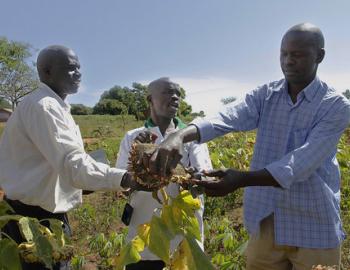Extreme weather found to affect 60% of small businesses in Kigali, Rwanda
Extreme weather found to affect 60% of small businesses in Kigali, Rwanda
Climate change has the potential to cost small business owners billions in damages. Several research projects look at how larger businesses respond to extreme weather events but there is little knowledge on how small businesses are coping with the impacts of climate change. adelphi and the Institute for Policy Analysis and Research (IPAR-Rwanda) have conducted a survey on how small businesses in Kigali, Rwanda are being affected by recurrent flooding in the region. This snapshot by Christian Kind and Dr. Aime Tsinda highlights the work so far.
Rwanda continues to be prone to flooding and landslides, and increases in future global temperatures only raise the risk of more intense and more frequent flooding in many regions of the land-locked country. CDKN supported the Government of Rwanda in developing the Green Growth and Climate Resilience Strategy and has helped set up FONERWA, a fund for environmental and climate change issues and the largest of its kind in Africa.
Strategies and programmes that tackle these issues are needed, and taking into account the role of the private sector is key to achieving long-term development objectives in the face of climate change.
Small- and medium-sized enterprises provide 84% of private sector employment in Rwanda’s rapidly developing economy and are vulnerable to shocks brought about from extreme weather events. A paint store owner based in the Nyabugogo River region described the situation in a very matter of fact way; “we are in the low-lying parts of a valley, flooding will always affect people’s businesses.”
Although flooding may have become a normal part of life in the region, policy-makers need to know: How much are businesses being affected by extreme weather events? How they are coping with the impacts? How they can be supported in preparing for and dealing with extreme weather?
In pursuit of answers, adelphi and IPAR-Rwanda with the support of the Kigali City Council, interviewed staff from 355 businesses along the Nyabugogo River in the western parts of Kigali. The area was selected because of its susceptibility to flooding and its abundance of small businesses, selling goods ranging from construction material, furniture and food. During their busy working day, managers took time to talk about their experience with flooding in the area.
The team found that around 60% of the businesses surveyed had been affected by floods since 2013. The most common damages that occurred were damages to stock which rendered it unsellable. Business owners also reported that cleaning and repairing damages after the floods took a lot of their time and that flooded or damaged roads made it impossible for customers or supplies to reach their premises. About 50% of the businesses affected by flooding managed to open for operation again within two days, however, 7% took at least seven days to open their business again.
When it comes to support in dealing with the aftermath of flooding, family and friends play the largest role. Returned questionnaires showed that neighbouring businesses only occasionally helped each other out.
About 30% of the business owners have taken measures to protect themselves against flooding, most of them moved goods higher above ground and used simple mobile flood barriers like small walls to block the entrance door.
To reduce the risk of future flooding, over 90% of the businesses surveyed are calling for an end to the common practice of throwing garbage into the drainage canals: street vendors, households and passers-by often dispose of their waste by dropping it into the partly open drainage canals – eventually clogging them. Collection of rainwater on private premises for reducing run-off also rated highly among the possible solutions.
Many requests for the city council and central government centered around building a larger centralised drainage system: “We need more rain gutters and larger pipes to evacuate the water that is running down the hills”, stated the owner of car repair shop close to the Nyabugogo river. At the same time, however, evacuation of the water via larger pipes into the river will prove difficult if the stream carries more water than usual as well.
After thorough analysis of this initial survey, the project team will carry out in depth discussions with all relevant actors, through focus groups and further interviews. Already, it is clear that the community have their own ideas. A manager of a small convenience store emphasised the need “to relocate the people living on the steep slopes of the hills and reforest the areas to stop the water from running down.” She also suggested, “if people stay on the hills, they should be obliged to install rain water tanks.” The project will continue to work with the community to assess the problems and develop solutions that will prevent the efforts of local businesses being reversed from the effects of climate change.

